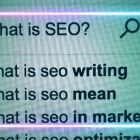If You Build It, They Will Come (Unless They Can't Find It)
Many of our clients come to us and say, "I have this great website which cost a fortune, but I don't know if it's making a difference."
We have news for you: just building a fabulous website isn't enough.
Is it a great first step? Absolutely! Websites are, hands down, one of the best tools for increasing traffic to your business and establishing yourself as a company. But once that site is alive and full of dynamic and relevant content, how do you tell people about it?
That's where SEO comes in. Properly used and maintained, SEO (Search Engine Optimization) can make the difference between a great site and a great site that actually works.
Let's break this down a bit. Search engines (the most famous one starts with a "g" and rhymes with "oogle") are the tools on the internet that do all the heavy lifting. When you enter a specific word or phrase--for instance, "house painting"--the search engine literally searches through thousands and thousands of websites to find the words "house painting."
There are all kinds of logarithms (or rules) that determine what search results appear in response to a search and how those search results are organized. The logarithms are responsible for whether your site appears third on the list, or 103rd.
SEO can be either organic or inorganic. While both do primarily the same thing--make it easier for visitors to find your site as the result of a search--they use different tools to do that:
- The organic SEO method looks at the site's content, structure and indexability (i.e., how easy is it for search engines to find relevant content within the site). This method tends to be more evolutionary and allows for more finessing and interpretation of your site's content.
- Inorganic or pay-per-click (PPC) SEO is much like buying an ad in the yellow pages. Your ad's ranking on the page depends on a combination of two factors: your budget, and your ad's click-thru-ratio (i.e., the number of times visitors click your ad vs. how many times it is displayed). This method is more objective and allows for more empirical reporting of your ad campaign's effectiveness.
How can you make SEO work for you? There are three things to keep in mind:
1) Content
2) Research
3) Maintenance
Content is critical. Describing your company, products and services in a way that attracts visitors, provides accurate information and encourages them to convert to a sale is like trying to hit a moving target. Your website copy needs to include the right mix of keywords in the right locations and with the right frequency. Figuring out the right formula for your site, in your industry and with your audience is the big question.
Getting to that right formula requires research and practice. Knowing what to say, how and where to say it...learning what works and doesn't work...staying current on ways to get the most from your investment...this is the point when many shy away from using SEO. The background work can be daunting, and just when you think it's figured out, something changes.
Which brings us to maintenance. Realizing a strong return with SEO means you can't set it and forget it. Whether it's trying new ads and keywords, tweaking delivery times and budgets or testing multiple campaigns, it's important that you revisit your SEO parameters and click-to-conversion rate on a regular basis with a willingess to make changes as needed.
If you don't understand the difference between SEO and REO Speedwagon, find a reputable agency who will keep an eye on the effectiveness of your SEO and make recommendations regarding ways to improve the return.
If you continue to invest in this tool, visitors will continue to visit your "field of dreams"...and you can bet they'll find it.
Next month, we'll investigate other ways to reach clients and prospects in the virtual world.
 An agency-eye view of Marketing, Advertising, Branding, Design & Media.
An agency-eye view of Marketing, Advertising, Branding, Design & Media.




